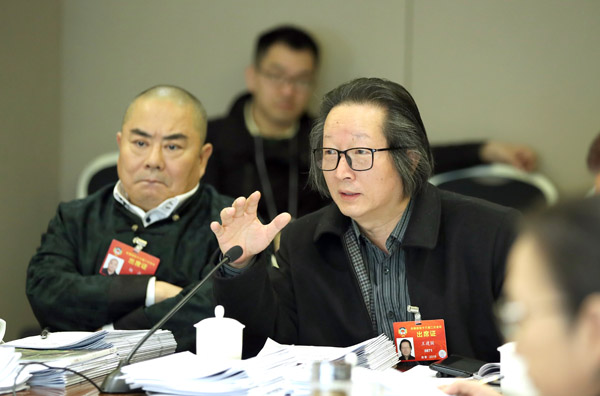 |
Wang Jianguo (center), a documentary director with China Central Television, speaks at a culture group discussion of the second session of the 13th National Committee of the Chinese People's Political Consultative Conference in Beijing on Sunday. [PHOTO BY ZOU HONG/CHINA DAILY] |
Moviegoers in China in the 1960s and 1970s will probably still remember watching newsreel being played on the big screen before the main feature began. These short video clips usually featured chairman Mao Zedong, former premier Zhou Enlai, or other leaders, attending to important State affairs.
At a time when TV was not that prevalent among the country's population, this was the main channel for the public to stay informed of current events, especially those pertaining to the nation's governance.
Thanks to the efforts of China Central Newsreel and Documentary Film Studio, over 400,000 minutes of footage remain - more than 277 days' worth - dating back to the late 1930s' Yan'an, a city in Shaanxi province, which was the national base for the Communist movement back then.
Such newsreels and films are currently housed in an old warehouse on the outskirts of western Beijing, while the country's political advisers call for better protection and usage of them.
During the second session of the 13th Chinese People's Political Consultative Conference National Committee, which ended in Beijing on Wednesday, Wang Jianguo, a member of the committee and a documentary director with China Central Television, proposed to digitize these precious files that record the history of the country.
Most of these films have no copies, according to Wang.
"Should any of them get damaged or if there is an accident, some of China's visual history would be lost from the nation's collective memory forever," he says.
"The celluloid is highly flammable and the films will only survive around 100 years if they are not properly looked after."
These films capture almost every crucial moment in history of New China, including the birth of the CPPCC National Committee in 1949. During the 1990s, when videotapes became widely used, such film-based footage became less common, according to Wang.
Some material have been edited into full-length documentaries, but many more contain just uncut, original footage.
However, according to his survey, out of 277 days of film, only one-fifth of it has been copied to videotape, which he says is also not safe enough.
"Digital recording is the best way to preserve these files," he explains. "We have to leave them nice and complete for future generations."
Nevertheless, he understands the difficulty of handling such a huge collection.
China Central Newsreel and Documentary Film Studio is now a unit of CCTV. In his work, Wang frequently borrows related material from the studios. For example, in his acclaimed 2016 TV documentary, Zhu Meng Lu Shang (On the Way to Realize the Dream), he uses a lot of old footage when reviewing the history of the Communist Party of China.
"When we used the films, for example, even we had no idea who some of the people appearing in the footage are," Wang recalls.
His team had to refer to older filmmakers from China Central Newsreel and Documentary Film Studio to put names to faces.
"If digitization is realized, facial recognition technology can be introduced to easily solve that problem," the director says.
However, a lack of financial support is coming in the way of realizing that goal.
In 1998, Zhou Enlai's Diplomatic Career, a production which was entirely edited from the original footage of China Central Newsreel and Documentary Film Studio, became the highest-grossing domestic film screened in China that year. However, Wang says, most documentaries lack enough motivation.
"More filmmakers have endeavored to restore old feature films and return them to the big screen," Wang says, "but documentaries are of a lower economic value."
Wang's proposal has been widely backed by other members from cultural and art circles within the top political advisory body. As this year marks the 70th anniversary of the founding of New China, light has been shed on the issue, and there are moves to try and solve the dilemma.
In a panel discussion, Wang Chunfa, director of the National Museum of China, says his institution would be prepared to accept the film reels, thus offering better conditions for their preservation, while Liu Yuzhu, director of the National Cultural Heritage Administration, says the footage is an important cultural relic that required national-level protection. He also revealed that State leaders had signed suggestions for the related work.
"Once they are categorized, we can establish another institution, like a national archive or national library, to open some of them to the public for free," Wang Jianguo says. "That will enable our Chinese stories, which are about decades of achievement and development, to be better told around the world through documentary footage."
wangkaihao@chinadaily.com.cn